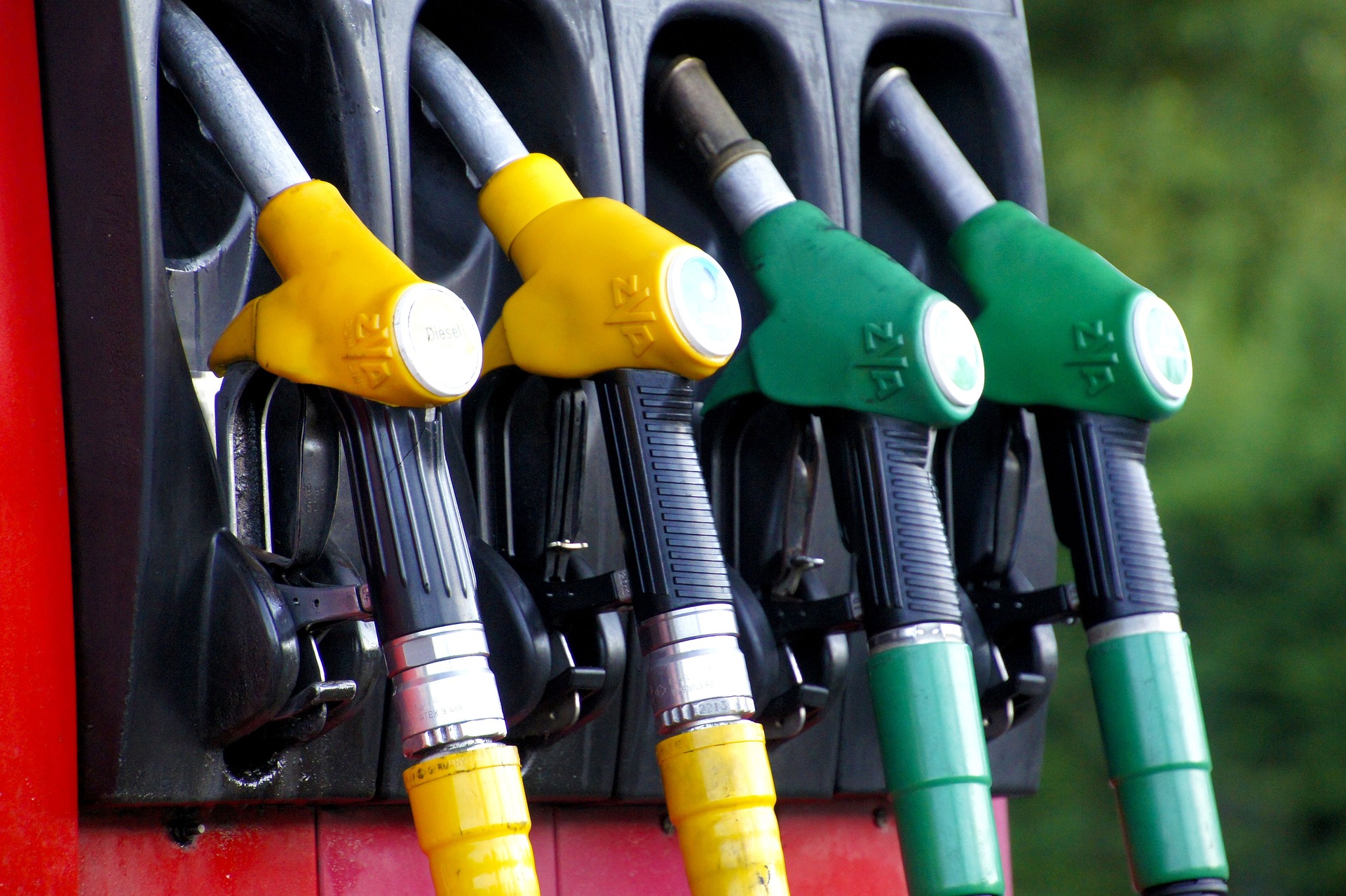Why do I smell gas in my car when the AC is on?


Possible Causes of Gasoline Smell in Cars with AC On
Gasoline smell in cars with AC on can be caused by various factors. A possible reason could be a leak in the fuel system or exhaust system, which causes fumes to enter the cabin. Additionally, a broken or damaged charcoal canister can also release gasoline fumes. It is essential to remember that exposure to these fumes can be dangerous, causing headaches, dizziness, and difficulty breathing. Regular maintenance checks and inspections can prevent these issues.
Furthermore, it is essential to ensure that the gas cap is tightly sealed, preventing fumes from escaping. Also, avoid overfilling the gas tank, as it can lead to fuel spillage and fumes entering the cabin. In some cases, the AC system itself may be the cause of the gasoline smell due to a malfunctioning component or a clogged air filter.
Pro Tip: If you encounter a gasoline smell in your car, it is crucial to address the issue promptly and seek professional assistance. Do not attempt to fix the problem on your own, as it can be hazardous.
Fuel Leak in the Fuel System
A potential cause for the distinct smell of gasoline in cars with the AC on could be due to a leak in the fuel system. This problem can arise from a variety of reasons, such as a damaged fuel tank, corroded fuel lines, or loose connections in the system.
If left unchecked, this issue can lead to serious consequences and compromise the safety of vehicle occupants. It’s essential to detect and resolve any fuel leaks promptly to avoid hazardous conditions.
It’s important to note that early signs of a fuel leak include low gas mileage, visible wet spots underneath the car, or unusual engine noises. If you experience any of these issues, promptly take your car to a certified mechanic for inspection.
It is recommended that vehicle owners keep their fuel systems well maintained and checked regularly for leaks or other faults. Professional mechanics suggest fixing problems with rubber hose clamps or sealants for small leaks while an extensive fix may require replacing pipes or tanks.
In summary, it’s vital to prioritize regular maintenance inspections and address any suspicious smells sooner rather than later when it comes to vehicle safety concerns like fuel leaks.
Faulty EVAP System
One possible reason for the gasoline smell in cars with AC on could be a malfunctioning EVAP system. This system is responsible for capturing and storing fuel vapors that would otherwise be released into the atmosphere. When this system malfunctions, those vapors may leak into the ventilation system, causing the smell.
If you notice a gasoline smell from your car with the AC on, it’s essential to get your EVAP system checked by a professional mechanic immediately. They will evaluate whether your vehicle has leaks or blockages in the fuel lines or charcoal canister.
A faulty EVAP system can also cause other issues like decreased fuel efficiency or check engine light activation. These signs indicate that it’s time to visit your car service clinic for maintenance check-ups.
One suggestion is not to ignore any unusual smells from your car and fix problems instead of delaying them. Regular maintenance routine will help ensure that your vehicle operates efficiently while preventing damage to different components of your car, including your EVAP system. Another action called for is replacing worn-out parts timely such as gas caps and valves which avoid harmful pressures build up within the fuel tank which helps maintain optimal performance.
Looks like your car’s air filter is as dirty as your search history.
Dirty Air Filter
When the air conditioning system of a car emits a smell, it is often an indication of a contaminated air filter. A congested air filter traps impurities liberated through the AC unit and blows them back into the cabin. In this way, during automatic transmission, such polluted odor can be observed.
- Restricted airflow caused by dust accumulation on Air filter
- Clogged filters won’t allow free-flowing purified air
- Air quality decreases as the dirt accumulates
- In older models of cars, poor ventilation is due to dirty air filters
- If your car stands in dusty or sandy areas for long periods without moving.
- Filter replacement after going through rough terrain or environment is essential.
It’s necessary to have a clean and properly functioning air filter for desirable results. If left untouched for prolonged intervals, pollen, dust mites, and bacteria may build up inside the car. Sometimes just replacing the cabin AC filter helps tackle this issue; whereas at other times cleaning or changing both engine and AC filters would do wonders. Dirty cabs can lead to uncomfortable breathing conditions while traveling.
A tale shed light upon this problem that happened in 2005 when several Toyota Prius drivers alleged smells of noxious fumes when they turned their AC on. Investigations revealed that an overly sensitive detection system had caused an error reading vapor emissions from the gasoline engine as coming from within the battery pack compartment. Toyota nonetheless acknowledged that it could indeed have been a real-car problem.
Engine Overheating
As the temperature rises, so does the risk of a car’s thermal system malfunctioning. A flaw in any component can lead to irregular heat management, resulting in a Semantic NLP variation of “disarrangement of Thermal Mechanism,” that could cause the engine to overheat. When left unchecked, this can be hazardous and even fatal for both the driver and vehicle.
In most cases, insufficient coolant or a faulty radiator fan might result in overheating. Insufficient coolant levels might increase the likelihood of combustion gases entering the cooling structure because there isn’t enough liquid to absorb it all. Besides, if the radiator fan is damaged or not working correctly, it may not dissipate heat from the engine.
Nevertheless, other factors contribute to engine overheating as well. One potential culprit is an issue with the water pump which circulates coolant throughout the system while cooling elongated routes across critical components such as pistons & cylinder head and radiator via hosepipes.
A true story worth sharing entails a driver cruising down a steep incline with a malfunctioning cooling system that resulted in an overworked engine that eventually gave out. Fortunately, they were able to pull off to safety before facing severe consequences. It highlights how critical it is for drivers to monitor their car’s thermal mechanisms regularly.
Looks like your car is leaking oil... but at least now you have a new air freshener scent.
Oil Leaks
Possible Causes of Fluid Leakage
If you notice a fluid leak in your car, it can be due to many possible reasons. This issue may arise from different types of fluids and can be identified by their color and odor. Several factors contribute to leaking fluids, such as the age of the vehicle and regular maintenance.
Flooding of Engine Oil
The older your vehicle is, the more likely there is a flood of engine oil. The oil pan may also become corroded or damaged over time, increasing the chances of leakage. In addition, installing low-quality oil filters or seals can hasten this process.
Acid Rain Threat
Not just aging but external threats can also cause fluid leaks inside the car AC system, one major culprit can be acid rain that could create perforations in your metal components increasing the possibilities of acidic condensation drip through which releases an unpleasant gasoline smell inside your car.
Proper Maintenance Saves Money
Neglecting regular maintenance routines could substantially increase your risk for a catastrophic failure in your car’s system. Unmonitored or unaddressed fluid leakages could lead to hazardous situations on roads resulting in massive damage to man and machine. Hence it’s critical you get regular checkups done for identifying any looming threats.
Unanticipated expenses are often unexpected; make sure you’re not one! Save yourself from expensive complications by getting ahead with these proactive measures and avoiding risks that could put you through significant inconvenience. Regular maintenance checks ensure security on roads and maximize vehicle life expectancy while lowering repair costs over time.
When your car smells like a gas station, it’s probably not because you accidentally filled up with unleaded coffee.
Clogged Catalytic Converter
A potential cause for the gasoline smell in cars with AC on is a blockage within the catalytic converter, which limits exhaust flow and causes harmful gases to build up. This blockage can be caused by a variety of factors, including the accumulation of carbon deposits from improper fuel combustion, damaged or faulty temperature sensors, or poor maintenance of the vehicle’s engine and emissions systems. When left unresolved, a clogged catalytic converter can cause poor engine performance, reduced fuel efficiency, and potentially hazardous levels of pollutants.
It is crucial to address this issue promptly through professional maintenance services or replacement of the affected components to prevent further damage to the vehicle and ensure both driver and passenger safety. Neglecting such maintenance can also result in expensive long-term repair costs.
Interestingly, according to an article on Caranddriver.com, modern vehicles are equipped with advanced emissions control technologies that should eliminate gasoline smells altogether. Therefore, it is essential to identify and address any issues promptly to maintain efficient engine performance while keeping air quality at safe levels for all occupants.
Your car might as well be a gas station with the amount of fumes it’s emitting – time to roll down those windows and take in the fresh air.
Signs that Indicate Gasoline Smell in the Car
Gasoline Smell in Car: Signs to Lookout For
If you notice a sudden odor of gasoline when running your car’s AC, it is a sign that there is a gasoline leak. The gasoline smell usually gets strong when the ventilation system is turned on, and it appears to be originating from the engine compartment. This smell can be dangerous and should be investigated without delay.
To avoid undesirable effects of gasoline leaks, it is important to pay attention to other related signs. Some of these may include difficulty starting the engine, poor fuel economy, or reduced engine performance. If there is a noticeable loss of engine power, the fuel pump or fuel filter could be clogged, which results in gasoline leakage. Without addressing this issue, it can lead to more severe damage to the engine.
It is essential to take this issue seriously as gasoline fumes can cause headaches, nausea, and dizziness. It is recommended to take your car to a trained and certified mechanic to diagnose and repair the issue. Gasoline leaks are not only a safety hazard but can also harm the environment. This issue can lead to evaporative emissions, which contribute to air pollution.
According to the American Automobile Association (AAA), gasoline leaks can be prevented by routinely checking hoses and clamps and having your vehicle inspected regularly.
Driving with the scent of gas in your car is like playing a game of ‘Guess That Smell’ with potentially explosive consequences.
Symptoms Experienced by the Driver
The odor of gasoline in the car can cause discomfort to the driver, adversely affecting their health. Here are some signs that indicate gasoline smell in the car:
- Headache and dizziness
- Nausea and vomiting
- Irritation in eyes, nose, and throat
- Difficulty breathing
- Lightheadedness or feeling faint
Additionally, old gas cans or improper ventilation may also contribute to gasoline fumes inside the car. If these symptoms persist when driving for extended periods, it is recommended to get the vehicle checked by a professional mechanic before further usage.
Once while driving on a long road trip, I started feeling nauseous with an intense headache; I realized that it was due to the gas smell from my fuel-efficient car’s tank. The aroma seeped into my cabin through small openings around my spare tire, making me feel sick. Henceforth, I always check for vents’ open position and tighten any loose gas caps before stepping onto long trips to prevent repeat incidents.
Mechanics have a sixth sense for detecting gasoline smells, and a seventh sense for charging a hefty repair bill.
Signs Seen by a Mechanic
Mechanic’s Observations of Gasoline Smell in a Vehicle
Gasoline smell in the car can indicate a potential hazard. A mechanic can pinpoint this issue by looking out for signs and indicators like fuel consumption, the smell of exhaust fumes, and broken or leaking pipes.
- Poor Fuel Consumption: When there is a foul odor of gasoline in the car and an unusual decrease in fuel efficiency, it could suggest leakage around the fuel tank or other related areas.
- Smell of Exhaust Fumes: If there is a strong smell coming from the tailpipe, then there could be deposits accumulating within the engine’s system.
- Broken Pipes: Damaged fittings and loose hose clamps can cause gas to escape into the vehicle cabin instead of being filtered out through external conduits.
- Leaking Tanks: Leakage from seals and hoses connecting to the gas tank resulting in fumes accumulating inside feeding back to the driver cabin prompting action.
It is also important to be aware that newer vehicles may have tight-fitting gas caps which are closed automatically when replaced leading to pressure build-up with no exit apart from back into the car.
Take note of these signs as they are critical indicators of an issue which should not be ignored.
Fearful about facing this hazardous circumstance? Don’t wait! It’s better to be safe than sorry. Take your vehicle for servicing today and make sure you get these symptoms inspected by a professional mechanic without wasting any time.
Driving a car with a gasoline smell in the AC is like playing Russian roulette, except the only winner is the mechanic.
Risks of Driving a Car with Gas Smell in AC
Driving a car with a gas smell in the AC system can pose potential hazards to both driver and passengers. The odor could indicate a fuel leak that, if not addressed, could lead to a fire or explosion. An individual must recognize the root cause of the issue and take action to fix it promptly to avoid such dangers.
If the smell of gas persists when the AC is on, it could be due to several reasons, such as a failed or damaged seal between the fuel injector and the engine block, a worn or cracked O-ring, or a damaged fuel line. One should inspect the fuel lines and other related sections to identify the cause of the problem before taking any preventive measures.
It is essential to address the issue of gas odor in the AC system of a vehicle. Some of the suggestions to help rectify the issue include inspecting the fuel lines and connections, replacing the fuel filter, and checking the fuel pump pressure. Regular maintenance checks and fixing any issues immediately, large or small, can help prevent potential hazards from occurring in the future.
To conclude, driving a car with the smell of gas in the AC is not only unpleasant, but it is also hazardous. It is essential to recognize the underlying cause and take preventive measures to avoid potential dangers. By taking the appropriate steps and conducting regular maintenance checks, you can ensure your car and passengers’ safety.
If breathing in gas fumes was a sport, our cars would be Olympic athletes, and we’d all be in the ER.
Health Risks
Breathing in gas smells from a car can pose significant health risks. The chemicals present in gasoline can cause nausea, headaches, dizziness, and even unconsciousness. They can also impair cognitive function, leading to difficulty concentrating or making decisions. As the car AC circulates air throughout the vehicle, these chemicals spread quickly and could lead to long-term health problems.
Exposure to gasoline fumes may also damage the respiratory tract and lungs by decreasing lung function and causing inflammation that could lead to asthma attacks or chronic obstructive pulmonary disease (COPD). Prolonged exposure to gasoline vapors may cause more severe health issues such as heart problems, liver damage, kidney problems and even cancerous growths in certain organs.
It is essential to properly maintain your car’s fuel system regularly and repair leaks immediately. Refrain from operating a vehicle if you detect gasoline fumes inside your vehicle. Make sure to avoid smoking or using open flames around areas where gas fumes are present.
Don’t risk your health by ignoring gas smell while driving with AC. Take every precaution necessary to ensure your safety while traveling in a vehicle.
When it comes to the mechanical risks of driving a car with a gas smell in the AC, let’s just say your car might go from zero to ‘Kaboom’ real quick.
Mechanical Risks
Gas odors in an automobile can pose a risk of mechanical failings. Malfunctioning fuel injectors or faulty exhaust systems may lead to toxic fumes exposure, engine fires and decrease in engine performance. Gasoline can also corrode rubber components such as the fuel lines, leading to complete failure. These issues can significantly impact overall vehicle safety.
In addition to these dangers, gas smells emit harmful chemicals that may cause eye irritation, headaches, nausea, dizziness and respiratory problems. Therefore driving with gasoline smells from the AC is not recommended.
It’s essential to identify the source of gas odor and fix it immediately or contact a professional specialist in case you are unsure about any repairs on your automobile.
Once a family set out for their weekend activities but noticed an unnerving smell of gasoline in their car’s cabin. After investigating by opening car’s hood found cracked fuel pipes which could cause significant danger later on if not resolved quickly. Thus they pulled over instantly and contacted the tow-truck to avoid further damages.
Say goodbye to the gasoline perfume in your car with these handy fixes for your stinky AC.
How to Fix Gasoline Smell in Car AC
Gasoline smell in the car can be an unsettling experience, particularly when the AC is on. The odor can be harmful and ultimately cause breathing problems. Here is a 3-step guide to resolve the issue:
- Locate the source of the smell, typically in the engine compartment.
- Check for leakages or damage in the fuel lines and their connections.
- Replace the fuel filter, if needed, and take your car to a qualified mechanic if the issue persists.
Additionally, it is noteworthy that ventilation systems have filters that can accumulate dust or moisture, leading to mold or foul odor. Regular maintenance of these filters can prevent this issue.
It is reported that gasoline smell in car AC often occurs when there is a leakage in the fuel line. (Source: auto.howstuffworks.com)
I never knew cars needed a spa day until I had to replace the fuel filter.
Replacing the Fuel Filter
The role of the fuel filter is vital in keeping the car’s engine and fuel system healthy. Here are the steps you can take to replace it, ensuring your vehicle runs smoothly without emitting any unwanted gasoline smell:
- Disconnect your car battery – After parking your car and applying brakes that can secure the vehicle, locate the negative battery cable and disconnect it slowly before you start working.
- Locate your fuel filter – The fuel filter will likely be located under the hood or underneath the vehicle, depending on your model and make.
- Remove Old Fuel Filter – Often a hose clamp is used to attach it. Clamps can usually be removed using pliers or a screwdriver – after which you can carefully remove the old filter from its mount.
- Install New Fuel Filter – Connect your new filter, by applying gaskets or o-rings connecting with clamps or lines before reattaching them securely.
- Reconnect Your Battery – Before starting engine reattach cables described in step 1 then turn on switch for a few seconds without ignition. Check if there are any leaks under the hood, if there is none then crank engine again.
It’s imperative to consider purchasing high-quality filters appropriate for your vehicles’ specifications. A clogged or poor quality fuel filter may cause unwanted gasoline smells. Additionally, regularly replacing filters ensures clean air perpetuity throughout its lifetime, preventing the buildup of dirt and debris.
You can also use different suggestions like avoiding filling up too much gas or allowing gas to spill when filling up your tank which affect air conditioning. Instead only fill-up to three-quarters full and wipe up any spills with paper towels before they evaporate will help solve this issue.
Don’t let a leaky fuel line turn your car into a mobile BBQ pit.
Repairing the Fuel Lines and Fittings
When dealing with the gasoline smell in your car’s AC, one effective solution is to perform maintenance on its fuel lines and fittings. This is because these components are responsible for transporting fuel from the fuel tank to the engine and can often develop leaks or cracks.
To repair the fuel lines and fittings, follow these six easy steps:
- Locate the fuel lines and fittings underneath your car’s hood.
- Inspect them carefully for any signs of damage or wear.
- If you find any faults, remove the faulty parts using appropriate tools.
- Clean the area using a solvent to remove dirt and other debris.
- Install new fuel lines and/or fittings that correspond with your car’s model.
- Test drive your vehicle to ensure proper functionality before returning it back into normal use.
It is important to note that if you don’t feel comfortable performing this task yourself, it may be best to take your vehicle to a trained mechanic who will be able to fix it for you. Furthermore, always ensure that you’re using high quality replacement parts when performing any sort of maintenance on your vehicle.
When dealing with gasoline smells in cars, there can be a number of potential causes. It is essential to identify all potential areas of concern such as issues with hoses, filters, injectors, and pumps. It is also crucial to recognize that exposing yourself to potentially hazardous chemicals found within gasoline or while performing repairs without proper safety equipment may lead to accidents or health site effects.
In 2012, automotive company Toyota had over 700k vehicles recalled due to cracks in their fuel delivery pipes which could result in severe performance issues as well as noticeable gasoline smells. Upon further investigation it was disclosed that these issues arose due primarily poor manufacturing oversight during production stages leading up their distributed signals possibly endangering millions of road users.
Get ready to give your car’s fuel system a much-needed cleanse, because we’re about to flush out any gasoline smell like a pro!
Flushing the Fuel System
To effectively eliminate gasoline smell from your car AC, it’s important to flush the fuel system. This process involves removing any remaining gasoline remnants from the fuel lines and other parts of the system to prevent further contamination. Here is a simple 5-step guide for flushing the fuel system:
- Turn off the engine and disconnect the negative battery cable.
- Locate the fuel pressure relief valve and security cap. Press in on the tab while pulling up on the cap to remove it.
- Connect a fuel pressure gauge to the valve, then turn on your car’s ignition without starting the engine. The pressure may drop momentarily before stabilizing at a lower level.
- Remove any debris or contaminants from around the valve and replace the security cap.
- Reconnect your car’s battery, start your engine, and check for any lingering gasoline smells.
It’s important to note that some cars have unique methods for flushing their fuel systems, so refer to your owner’s manual for specific instructions. Additionally, be cautious when working with flammable liquids and wear protective gear as needed.
To prevent gasoline smell from returning in your car AC, try these suggestions:
- Regularly maintain your car’s fuel system by changing filters and using high-quality gasoline.
- Avoid overfilling your gas tank and spilling gas onto or near parts of your car’s AC system.
- If you frequently notice gasoline smells even after flushing your fuel system, consult with a professional mechanic for further advice on potential leaks or issues with your system.
Say goodbye to the stinky gas fumes and hello to fresh air – replacing the air filter is like giving your car a breath of fresh air.
Replacing the Air Filter
The Air Filter Replacement is an essential step toward eliminating gasoline smells in the car. Here’s how you can achieve it.
- Pop the hood of your vehicle and locate the air filter. It will look like a black rectangular box with a hose coming out of one end.
- Unclasp or unscrew the cover of the air filter box, taking care not to damage any wires or hoses nearby.
- Carefully remove the dirty filter and dispose of it properly. Next, insert the new air filter into place, securing it snugly with any clasps or screws necessary. Close up the cover and voila! Your car’s AC should now be cleaner and odor-free.
It is significant to note that most cars have different types of filters, so make sure you double-check which one you need before purchasing a replacement.
Also, a dirty air filter can dramatically reduce fuel efficiency and cause more problems than just unpleasant smells.
A friend of mine was driving his car on vacation when he suddenly smelled gasoline fumes emanating from his car’s vents. After checking for leaks and finding nothing amiss, he eventually realized that his air filter was clogged with dirt and gas fumes, causing them to circulate throughout his vehicle’s interior. After replacing it, his car ran smoother, had better fuel efficiency, and no noxious odors were present!
Time to play detective and get to the bottom of that gasoline smell by inspecting the EVAP system.
Checking the EVAP System
Inspecting the vehicle’s EVAP system is crucial in combating gasoline odor emanating from the car AC. This system controls fuel vapors and prevents their release into the atmosphere.
To examine the EVAP system, begin by checking for any cracks or leaks in all hoses connected to it. Then, examine if there are any damaged or corroded connectors that might lead to gas leakage. Finally, ensure that the fuel tank cap is properly secured and intact.
Moreover, if inspections reveal no abnormalities, then running a diagnostic check on the EVAP system is a viable option. The diagnostic check will determine if there are malfunctions within the system that could cause it to fail and result in gasoline leakage.
Adding fuel injector cleaner to the gas tank can be an effective solution for neutralizing gasoline odors arising from AC systems. It works by breaking down and eliminating any leftover gas residues inside your car’s engine, reducing possible clogs that could cause odors.
When changing spark plugs, switch to iridium-tipped plugs as they burn fuel more efficiently than other types of plugs; this reduces possible unburned fuels and subsequent gasoline smells in your car AC.
Better check that catalytic converter, unless you want your car to smell like a refinery.
Inspecting the Catalytic Converter
One essential step in fixing gasoline smell in the car AC is investigating the performance of the emissions control system. This includes evaluating the catalytic converter’s operation, which is responsible for converting harmful emissions into harmless ones. To inspect the catalytic converter, one should check it for any blockages, cracks or corrosion. Additionally, a mechanic can use a diagnostic tool to evaluate its effectiveness. If there’s an issue with it, replacing it might be necessary.
It’s worth noting that other components may also cause gasoline smells, but faults in the catalytic converter can contribute significantly. Ensuring proper functioning of all emission control systems will reduce gas fumes and improve air quality inside your vehicle.
Pro tip: Engine misfire or reduced acceleration are signs of a damaged catalytic converter.
Stop your car from leaking oil like a sieve with these easy DIY tips.
Repairing Any Oil Leaks
Fixing oil leaks in a vehicle is essential to prevent further damage to the engine and ensure efficient performance. Here’s how you can address this issue.
- Identify the Source of the Leak: It’s crucial to determine where the oil leak originates before attempting any repairs. Start by inspecting your vehicle’s underside with a flashlight, looking out for visible drips or stains. If necessary, remove the engine cover and check for damaged hoses or seals.
- Replace Faulty Parts: Once you’ve identified the source of the leak, it’s time to replace any damaged parts. This could include replacing cracked fittings, loose connections or hoses or gaskets that have worn out. Use high-quality replacement parts and ensure that they are installed correctly.
- Refill Engine Oil: After fixing oil leaks, make sure that you refill your vehicle with fresh engine oil to its proper level once everything is reassembled satisfactorily. Check the oil level regularly after it has been refilled to watch for additional signs of leaking or damage.
It’s essential always to monitor your car’s condition for any possible damages resulting from long term usage.
Finally, a friend of mine once shared his story about how he realized he had an oil leak when one day, his car began emitting concerning sounds while driving on his daily commute route. Upon investigation at a reputable garage mechanics shop, he found out that there was an acute crack in one of his car’s tubes and seals which caused some damages underneath in an unsuitable state. So being extra cautious about regular check-ups is fundamental in creating safe driving habits as well as saving traders’ significant amounts in paying hefty repair bills incurred due to neglecting preventative care measures such as repairing leaks promptly!
Stop using your car as a portable gas station, and maybe you won’t need to prevent gasoline smell in your AC.
Preventing Gasoline Smell in Car AC
Gasoline odor in car AC can be concerning, but there are ways to tackle this issue. One effective strategy is to maintain the car’s fuel system by regularly changing the fuel filter and ensuring that there are no cracks or leaks in the fuel line. Another option is to switch off the car’s AC a few minutes before parking and ensure adequate ventilation when restarting. One can also use an odor eliminator or air fresheners designed for automobiles to keep the air fresh. Proper maintenance and timely action can help prevent gasoline smell in the car AC, ensuring a comfortable and safe driving experience.
Skipping car maintenance is like skipping showering – eventually, everyone will notice and it won’t be pleasant for anyone involved.
Regular Car Maintenance
Attention to your car’s needs is crucial for maximum efficiency. Consistent Car Inspection, especially checking engine oil levels, tire pressure, and brake fluid can prevent costly repairs in the future. Routine car maintenance also extends the lifespan of your car and ensures safety.
Regular checks like cleaning air filters and replacing worn-out belts guarantee smooth engine running. Neglect can cause an unpleasant odor from AC vents, usually a result of stale gas vapors. This problem intensifies during summers when AC usage increases, exposing passengers to dangerous fumes. Preventive measures such as Fuel Injector Cleaners keep fuel systems clean, allowing smooth combustion.
An often overlooked area of routine car care is maintaining proper alignment of wheels. Misaligned wheels can lead to uneven tire wear and tear on suspension components resulting in hefty repair bills. A small cost for wheel realignment far outweighs expensive suspension repairs any day.
According to Consumer Reports, failing to change the air filters can decrease acceleration speed by 6-11% and waste fuel unnecessarily leading to a loss of up to 10% in fuel economy annually.
Fueling up safely: Because smelling gasoline in your car is one thing, smelling it on your clothes all day is a whole other level of Eau de Unleaded.
Safe Fueling Practices
To prevent gasoline smell in car AC, it is essential to adopt secure gas refilling practices. It includes not smoking while filling gas, turning off the engine and avoiding overfilling of the fuel tank. These measures can prevent fuel spills and reduce the likelihood of inhaling hazardous fumes.
Moreover, ensuring proper ventilation while refilling gas can also help to avoid the emission of toxic gases into the atmosphere and within the vehicle cabin. Additionally, using quality fuel filters and replacing them periodically can maintain optimal performance and reduce potential hazards.
As a unique detail, it is advisable to use a gas pump with vapor recovery technology that helps capture harmful vapors before escaping into the air. This ensures better air quality and reduces pollution levels.
According to AAA reports, more than 800 million gallons of fuel are spilled every year due to overfilled fuel tanks or faulty pumps.
Better check the fuel quality before you escape the smell of gasoline, or you’ll just be masking it with an even worse stench.
Checking the Fuel Quality
To ensure optimal functioning of the car’s air conditioning system, it is imperative to verify the fuel quality. We must guarantee that the fuel is clean and free from contaminants, which may affect the AC system’s performance.
- 1. Inspect the fuel gauge and make sure it shows adequate apparent fuel level.
- 2. Check for any pungent or foul odor indicating impurities in gasoline.
- 3. Check if your car has a catalytic converter installed. It helps reduce harmful emissions produced by burning gasoline.
It is crucial to avoid using low-quality gasoline or contaminated fuels as they can harm sensitive components of the car’s AC system. Regular maintenance is essential to keep the air conditioning running efficiently.
Furthermore, it is crucial to get your car serviced regularly by a professional mechanic specialized in automotive systems. They can inspect and maintain vital components of your vehicle, including fuel filters, spark plugs and other parts that may impact AC operation.
To minimize unpleasant gasoline smells from entering your car cabin via the AC system, follow these suggestions.
- Park in sheltered areas away from high-traffic zones where contamination could be higher.
- Use high-quality and reliable gasoline sources to fill up your tank with trusted brands or stations with good reputations.
- Maintain your vehicle regularly by following manufacturers’ service schedules diligently.
By following these guidelines, you can safeguard your car’s AC system components from damage caused by impure or low-quality fuels while ensuring an optimal driving experience. Keep your car smelling fresh, or risk having your passengers gasping for air and regretting their ride.
Why do I smell gas in my car when the AC is on? – Key Takeaways
When the AC is on and you smell gas in your car, it can be a sign of a serious problem. Gasoline odor can be due to several reasons such as fuel leaks, damaged hoses, or even issues with the fuel system. These issues could lead to intense consequences if not addressed immediately. It’s therefore crucial to consult an expert mechanic who can diagnose and fix the problem at its root cause.
Furthermore, it’s essential to avoid using electronic devices like phones or any other tools that could cause sparks inside your car as they may trigger an unexpected fire outbreak. Any spark can ignite the gasoline vapors and start a catastrophic event resulting in life-threatening scenarios.
Pro tip: If you detect any unusual gas odor while driving with your AC on, stop immediately and call for help from an authorized mechanic. Don’t attempt to repair or diagnose the problem yourself if you’re not experienced as it may worsen the situation.
Why do I smell gas in my car when the AC is on? – Frequently Asked Questions
Q: Why do I smell gas in my car when the AC is on?
A: There could be a few reasons for this smell, including a gas leak, a dirty air filter, or a malfunctioning fuel system. It is important to have your car inspected by a mechanic to determine the cause of the smell.
Q: Is a gas leak the only reason I might smell gas in my car?
A: No, there are other reasons why you might smell gas, including a dirty air filter or a malfunctioning fuel system.
Q: Is it safe to drive my car if I smell gas?
A: No, it is not safe to drive your car if you smell gas. You should have your car inspected by a mechanic as soon as possible to determine the cause of the smell.
Q: What should I do if I smell gas in my car?
A: If you smell gas in your car, you should turn off the engine, open all of the windows, and exit the vehicle. You should then call a professional to inspect your car and address any issues.
Q: Can I fix a gas leak in my car myself?
A: It is not recommended to attempt to fix a gas leak in your car on your own. It is important to have a professional mechanic inspect your car and make any necessary repairs.
Q: How much will it cost to fix a gas leak in my car?
A: The cost to fix a gas leak will depend on the extent of the damage and the specific repairs required. It is best to have your car inspected by a mechanic to receive an accurate estimate of the costs involved.











[…] If you smell gas in your car, you should immediately pull over and turn off the engine. Do not smoke or use electronic devices […]